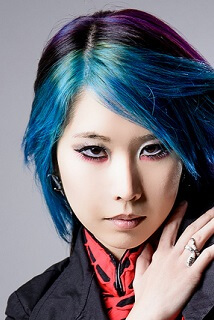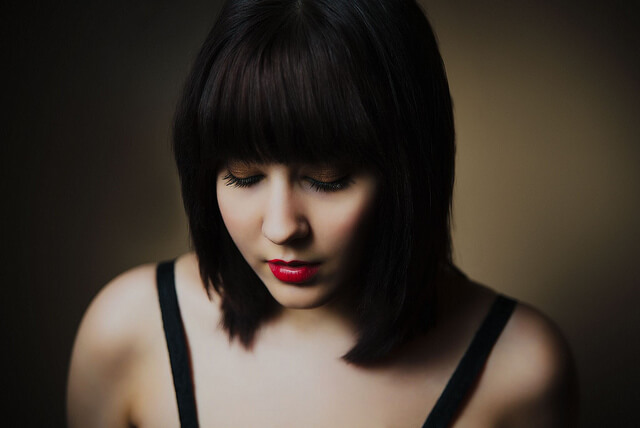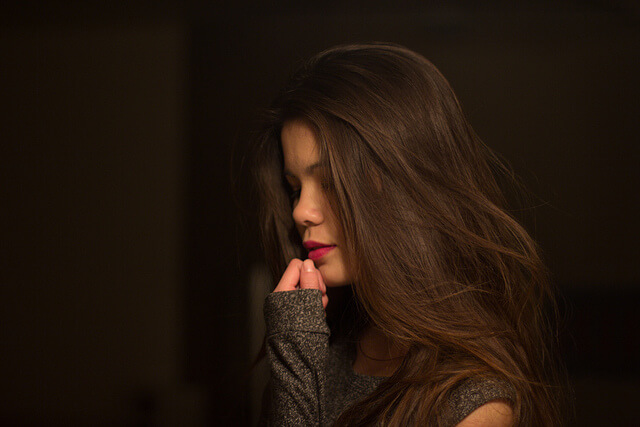
|
| [1] |
Why does hair color end up too dark?
There are a few major reasons why hair color can end up darker than expected, and these relate to the condition of your hair and how the dye was applied:
- Porosity
- Shade selection
- Brand differences
- Development time
When hair is damaged, the cuticles on the surface of the hair fail to seal properly, or may no longer even be present anymore. This leads to your hair becoming more absorbent, and prone to dryness because the action of the cuticles is necessary to maintain moisture balance and keep your hair properly hydrated.
Other factors include the shade you select, and how it is applied and allowed to process. If you choose a shade that is darker than the color you have in mind, this will obviously lead it becoming too dark, but the problem here is with the product itself. Box dyes, and sometimes even salon dyes, don't always have an accurate shade description and it is possible to mistakenly choose a shade that looks right, but turns out too dark.
Development time also plays a part in this because it determines how long the dye is allowed to absorb. In hair that is light, previously processed, or porous, a shorter development time is often necessary to prevent the dye from becoming too dark. The recommended development time is not necessarily what is best for everyone.
Finally, individual brands can differ in how dark they are. The same shade of dye in one brand can be up to 1 level darker in a different brand, and this can cause problems if you're switching brands or using a new dye for the first time.

|
| [2] |
How to fix your hair
Now that you understand why hair color turns out too dark, you'll be better able to prevent it from happening in the future. However, your hair will still need a color correction to get it from its current darker color to the shade you desire. There are three effective ways to do this:
- Clarifying shampoo
- Bleach bathing
- Hair dye remover
Fading hair color with shampoo causes no damage, but takes longer and isn't as useful in situations where the dye is much darker than what you want. A bleach bath takes about 20 minutes to prepare, apply, and process for this kind of correction and gives rapid results, but is not suitable for heavily damaged hair. Dye remover doesn't damage hair and gives quick results like bleach, but is more difficult to use for this kind of correction where you only want to remove a little color.
Clarifying shampoo

|
| [3] |
If you need to lighten dyed hair and your desired color is only 1 level lighter, or less, clarifying shampoo is a great option because it doesn't damage your hair and you won't need to apply any chemical products.
To use this option, simply wash your hair 1 - 3 times with clarifying shampoo and then apply a conditioning treatment. The conditioner is necessary to reverse the dryness this method causes due to shampooing. You can use this technique every time you wash your hair until the hair dye has lightened sufficiently.
Bleach bath
A bleach bath, or bleach wash, is a combination of hair bleach and shampoo. When you mix the two products together, the shampoo dilutes down the bleach and also helps lift out dye. This makes it highly effective for fixing a hair color that is too dark.
The process is mildly damaging however, and thus shouldn't be used on hair that isn't in good condition. It's best used in situations where you want a quick fix, have fairly healthy hair, and the color you're attempting to correct is 1 level darker or more than what you actually want.
Dye remover
Hair dye remover breaks down permanent dye, allowing it to be rinsed out of the hair. As it breaks bonds in the dye molecules to reverse the process that makes the dye permanent, it has no effect on temporary and semi-permanent dyes and thus can't be used to lighten dyed hair where a permanent dye wasn't used.
If your hair color is very dark, to the point that it is 2 levels or more darker than what you actually want, dye remover should be used as recommended to strip out as much dye as required. If you need less lightening, this process is more difficult to control because of the way it works.
One way you can improve control in this case is to add shampoo to the dye remover. Like with bleach bathing, shampoo added to dye remover will dilute it down and reduce its effect. You will still need to watch it constantly though, as the lightening from a dye remover can be quite dramatic.

|
| [4] |
Tone correction
After lightening dyed hair to your desired level, there is always the chance of warmth appearing in your shade. This is more likely to occur when you lighten your hair more than 1 level. As well as correcting the darkness, you may need to correct the tone of your hair to finish the color.
To do this, you will need to look at what color the warmth is and determine which toner to use based on that. Orange, gold, and yellow tones can be corrected with an ash dye, 1 level lighter than your hair. Strong red tones will need to be corrected with a dye that contains green tone for effective neutralization.
More information:
- How to remove hair dye - Discover how to remove different types of dye...
- Deep conditioning treatments - Find out how to use a deep conditioner to prevent dryness and keep your hair healthy...
- Hair care: Which shampoo to use - Discover the different kinds of shampoos and learn how to choose the right one for your own hair...
Do you have a question about fixing a hair color that is too dark? Leave a comment for tailored advice...
Hi! I need help I died my hair very dark. I'm going to remove the artificial color with color oops and I know that the resulting color will be very red. Which dye should I use to get it to be a light ashy brown?
ReplyDeleteHi IrishGurl,
ReplyDeleteThis depends a lot on how much dye is removed by the dye remover. To get to a light ash brown shade, you need to tone it to neutralise warmth and achieve the ash result, but this won't look light brown if your hair is still too dark. You can tone any unwanted warmth out, but the depth of a colour is dependent on the total amount of pigment present, including that of the toner.
Ideally, if the dye remover doesn't strip it out to slightly lighter than a level 5, you may have to use the remover again until it does, or apply a bleach wash to lighten it further. After that, tone with light ash brown (5A or 5.1 in most brands, but do check your preferred brand to ensure it is the corrrect shade).
If there is a lot of red tone present before dyeing, you will need to use either a green-based ash or add a green additive to the ash dye you're using for it to tone perfectly. Otherwise, an ordinary ash dye is fine, but some warmth can carry over if the base is predominately blue because blue only neutralises orange, whilst green is required for red tone. You can always tone with your preferred light ash brown shade and then adjust the tone afterwards if there is still warmth present.